Stories of small business: how in Yuzhno-Sakhalinsk it just went awry
The first thing I learned about our store in Yuzhno-Sakhalinsk is that the owner Danil starts his working day half an hour or an hour ahead of the trading floor. Because the store still needs to be dug up:
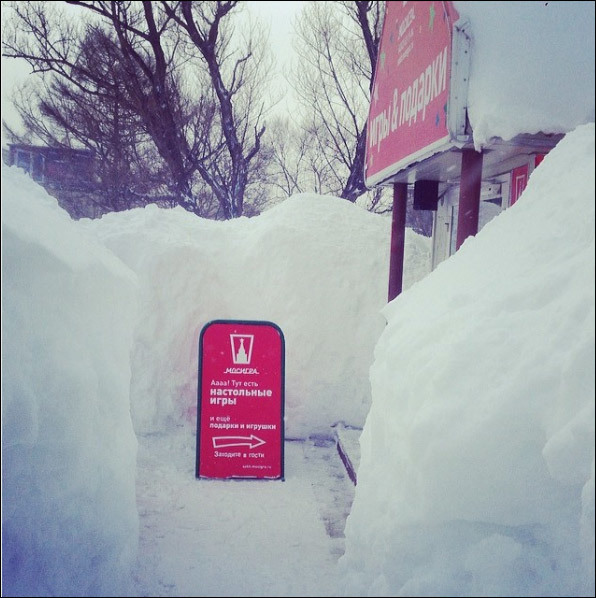
This is the first point, it was located in a relatively open area (a pavilion in the central market), so there was a lot of snow in the wind. Half an hour with a shovel - and you're cheerful, healthy, and the door can already be opened.
The second thing I learned about Yuzhno-Sakhalinsk is that there are 9,315 kilometers of roads to it. Or 8-9 hours of flight by plane (depending on whether you are going there or back). It can be reached by train and ferry, but it will be about 2 weeks.
But what is important for business - the main lesson of Yuzhno-Sakhalinsk is the use of social networks in small cities. Well, a model store in a city where half of the population produces oil.
Now Yuzhno-Sakhalinsk is the second capital of winter, it is very preparing for the Olympics, they are doing everything on snowboarding and skiing. 160 thousand people live in the city - at the time of the opening, we thought that this was the minimum border for the dashboard store in the city (fewer people - unprofitable). Experience has shown that we were mistaken - for 160 thousand people in the city there are now two prosperous Mosigra stores from one franchisee partner.
In addition to the designated 160 thousand "ours", there are also American and German (Danish, Austrian and so on) settlements, a kind of high-tech villages. Specialists live there with their families, help pump oil in the bins of the motherland. This is a kind of exclave in fact: "ours" are not particularly allowed there. About 100 thousand people arrived according to a rough estimate. The main Sakhalin career dream is to work for a foreign company.
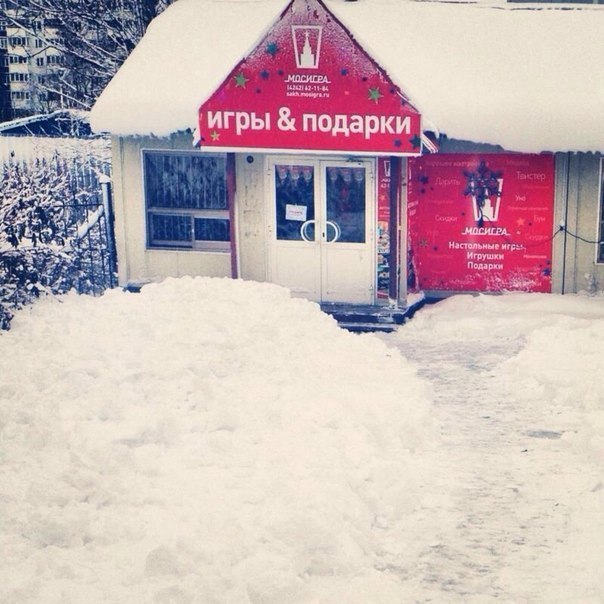
The first point was opened in the central market (it has already been demolished) - it is such a combination of small houses and large spans that a place is formed where you can get everything that a resident of the city needs. The very, very center at that time. The opening took place on December 11, 2010, it was one franchise store of the first wave - Yuzhno-Sakhalinsk became the tenth city of Mosigra.
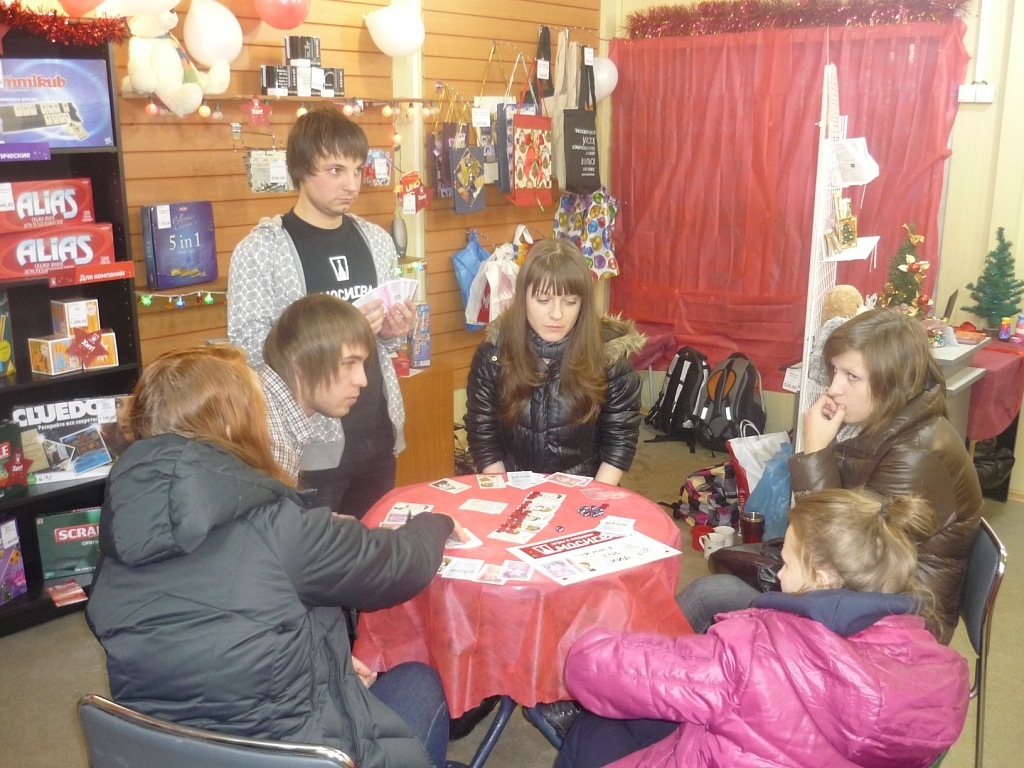
The area of the first point is 21 square meters. There were no articulate standards of layout, no equipment, nothing tricky yet, so the first point was very reminiscent of how we usually imagine a toy store. A little later, everything came, but at that time it was not the main thing.
The main thing was that the store opened on December 11, and at first Danil did not believe that the amount of goods that the manager from Moscow advises him should really be taken. Well, something dofiga, more like a desire to poke everything at once on the first purchase, right?
Looking a little ahead, I’ll say that on December 31, EVERYTHING was dismantled from the store for lunch. The last opened Monopoly left without a couple of figures - it was sold at a discount, because the client really asked for at least such a thing for his holiday. Only the torn Twister remained. It is important to plan ahead - for 3 critical days of December, when half the goods are taken apart, the decision is no longer made.
And then the worst thing - people still go, but there is no product.Absolutely not. And you are not somewhere, but on an island on the very edge of the world's largest country. Normal delivery is one and a half to two months. Two months without goods with a bare ass and paid rent - the idea is so-so. And scares people, but they are coming. As a result, Danila made a strong-willed decision and ordered an air delivery - 22 thousand rubles per cubic meter. His prices then jumped 15% up from normal retailers - then we had not yet demanded uniform prices across all the country from all stores. Later, a year later, a cheap delivery was found (just 6 weeks long), and everything else. Then it was necessary to survive.
Warehouses of transport companies earned the 8th. The plane arrived on the 9th, and cargo was managed to be received practically from it in the early morning. The store opened and earned again.
Now we look at what was being done in the city so that people knew about board games. First and foremost, of course - just open a store with a sign. In a city of 160 thousand inhabitants, this is already an event. As we later found out from the experience of Vladivostok and Khabarovsk, it’s important, because Moscow networks do not often reach these parts, and many people come to look at the curiosity.
The second simple step is to launch an information wave. 160 thousand inhabitants are 3-4 “handshakes”, that is, if at the first stage you tell all your friends and call 40 people to the first game room, the city will know in 3 months. The first game library was held a week after the opening of the store - they gathered people in a cafe at the station on the weekend, brought games, played. For the city, free games in cafes were just a gift amidst a rather large deficit of events, and therefore everything went off simply with a bang. There were 5 animators at the first game library, but they were still missing. Later, experienced players explained to the friends the rules of the games themselves, but for the first time - everything is generally new and incomprehensible.
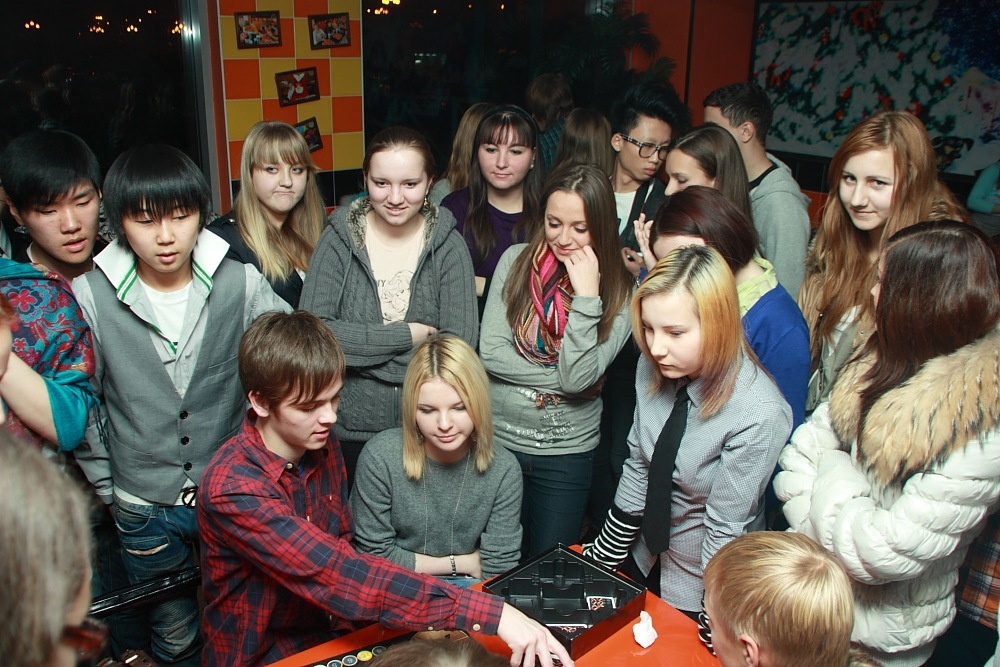
There wasn’t enough space at the first game library
After that they played there every 2 weeks until they changed the point. People were waiting for these games, they were constantly asking when it would be possible. In general, this is a great option to spend a weekend in a city on the edge of the earth.
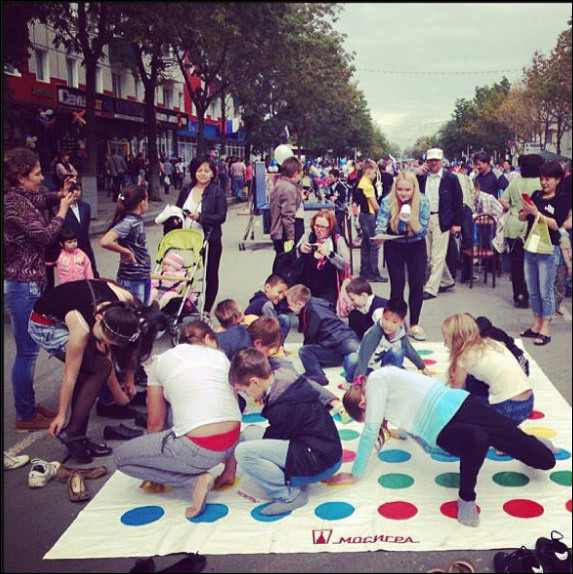
Game library at a city holiday
From advertising, there was also a banner on the main Sakhalin site: it did not give direct sales, but accelerated people's acquaintance with the point. Banners, by the way, worked in small cities right up to 2015, according to my assessment - in millionaires already in 2011 there was no sense in doing this.
In April, the first offseason began, revenue went into decline. They launched a video about the store on local television in the morning show - they showed it 4 times for 10 minutes. Sales were immediately single, but that video was remembered for a long time, so it seemed to be useful. They survived the off-season, this time they were bought correctly for the holidays, they all prepared and the lines worked perfectly.
In 2012, after the second New Year, Danil formed a rather large pillow of money, and it became clear that it was possible and necessary to expand. In general, our model insures the owner of the point pretty much - it is assumed that he does not invest a lot of money from the very beginning, but opens a small store, then grows the market, and then increases the number of points or moves to a large store.
So, the central market seemed to be about to be demolished, but not soon. Danil looked towards the CityMall shopping center. It was possible to agree only on March 5 - the very ass of the off-season, but in the case of the shopping center the choice was either to make as they want, or not to do. Today everyone wants us and they are ready to meet us within reasonable limits, and then the word "Mosigra" was something incomprehensible to Yuzhno-Sakhalinsk. In general, the store worked for 5 months. The situation turned out to be offensive - they could not fill the new shopping center, and the third floor was deserted, no one went there. After closing the playground on the floor, Danila wanted to move to the first, but they tried to assemble all the toys in the third, and the owners of the shopping center refused him. As a result, I had to close on August 1 - the point worked somewhere around zero. Now he regrets - the shopping center has grown and become very cool, and in a smart way it would be worth waiting and then skim the cream. But then it was unclear that CityMall would fill up, and therefore the decision was still correct. But Danila still nibbled his elbows for almost a year - grabbing a point of 11 squares in such a shopping center would be very, very profitable. Typically, the premises are cut in blocks of 40-50 meters, but here it just turned out a holiday.
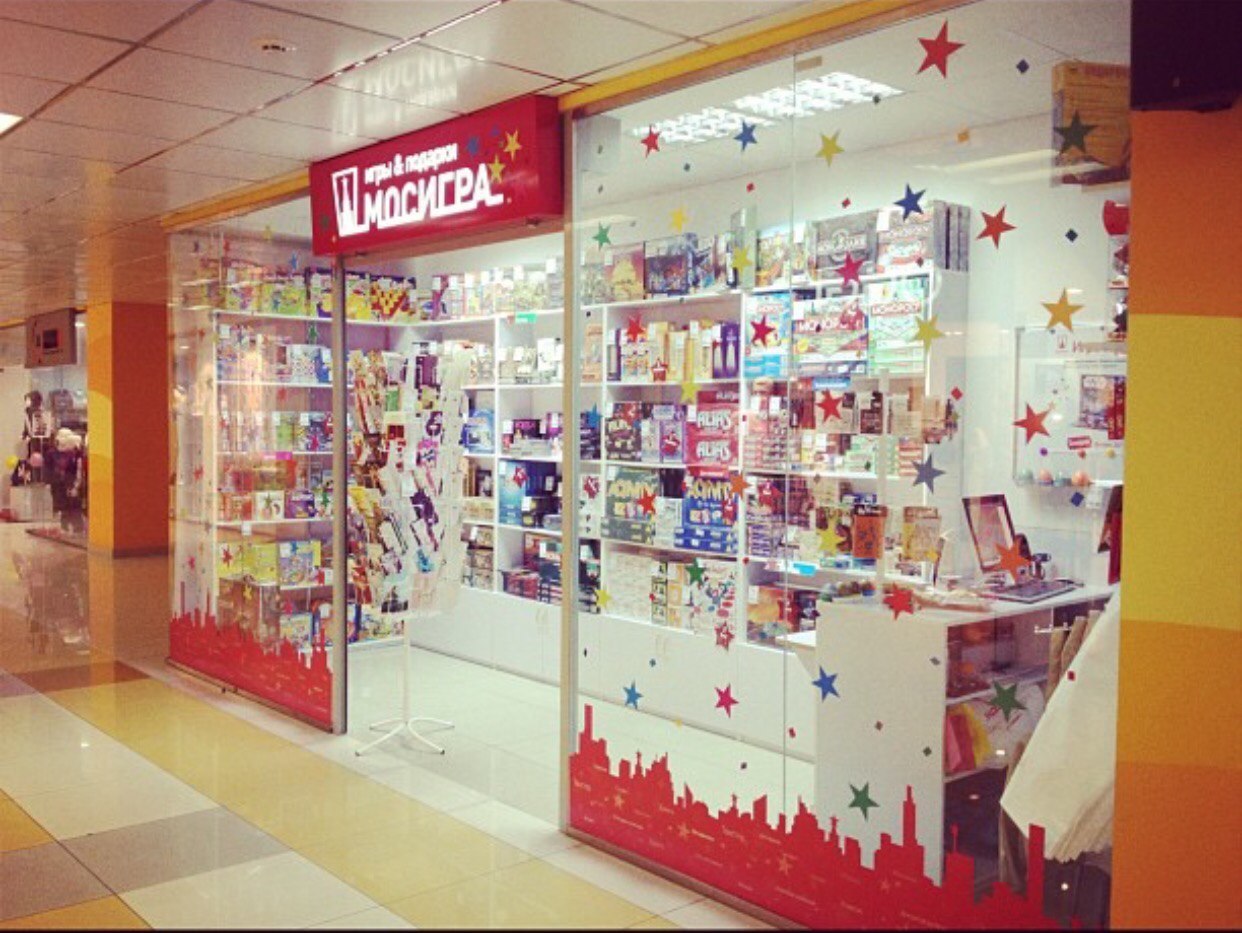
Problems with the central market rose to their full height - they had to leave. Found an option on Lenin Street. This is a kind of "Arbat" in Yuzhno-Sakhalinsk. In every city there is such an important walking street: in Yekaterinburg, for example, this is Weiner; in Vladimir - Bolshaya Moskovskaya, in Voronezh - Plekhanovskaya and Lenin, and so on. Usually it’s not possible to stand on such a street directly with a facade - either a basement or a second floor; rent is very expensive. Again, in Yekaterinburg we are standing in the shopping center on the third floor, in Vladimir - 50 meters from the stream on the second line, and in Voronezh the whole story with this point, Zhenya had to open a cafe there to stop renting.
It turned out to pick up a “facade” place with an area of 22 squares, with a separate entrance. Right next to the popular Veranda cafe. Expensive, but still it’s not 40 or 60 square meters, so it fits into the model.
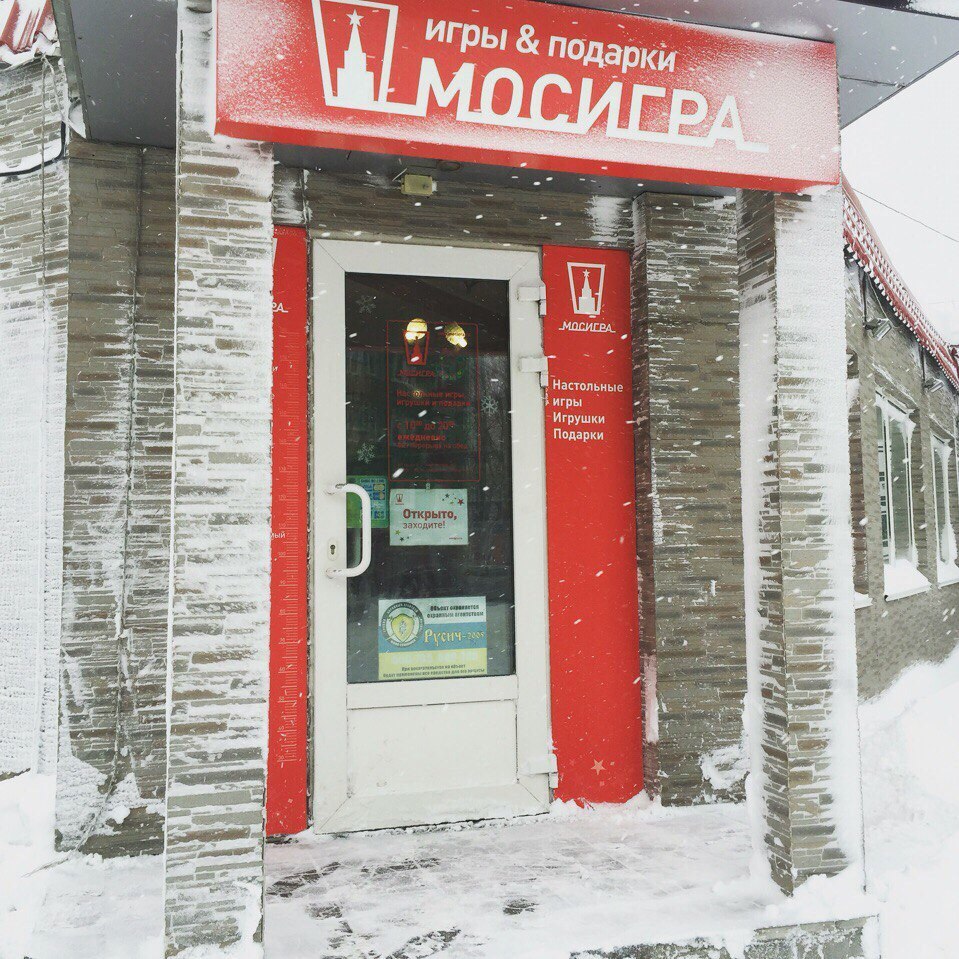
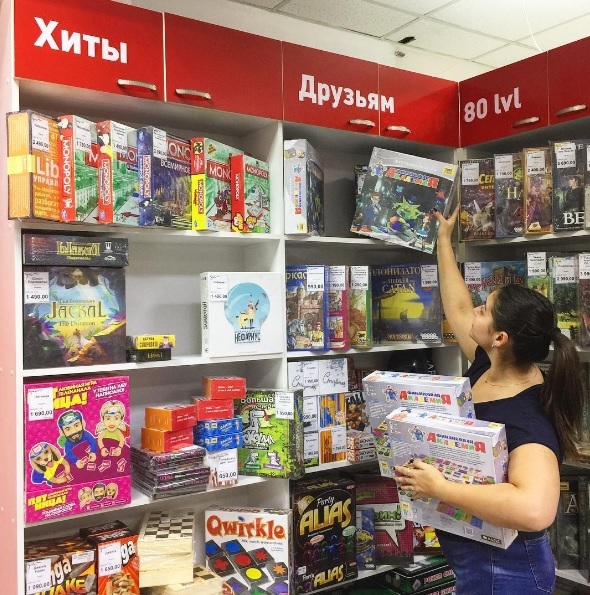
New design
Generally, just such an area on the second store is also a kind of luck. However, given that they searched and waited for almost a year, the luck is understandable.
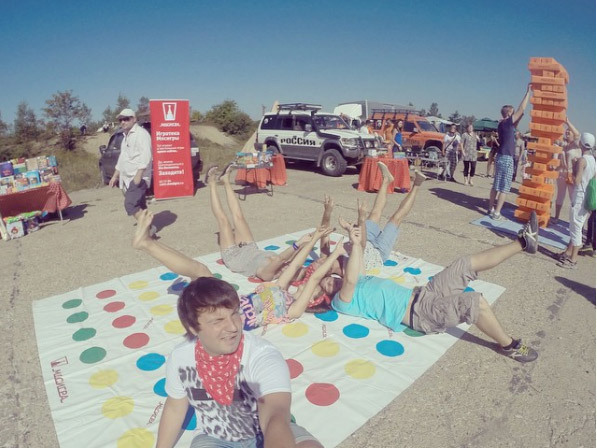
Summer that year was warm, sunny. It turned out especially well that it happened on the weekend.
Two stores worked simultaneously. In the first months, revenue at the new point was less, people just got used to its location. The store worked at zero or a small minus (10-15 thousand a couple of months before the holidays). And after the new year it took off and began to overlap.
The central market was cut out, and at the same time an unusual “tectonic” process began - the center shifted in the city. It so happened that he “slipped” a little to the side because of the transport infrastructure and the abundance of large stores. It was there that Danil opened the third point in the Ganesha shopping center - a small shopping center by our standards, but very noticeable on the stream.
There is such a peculiarity in working with social networks: in Moscow, for example, VKontakte almost does not work, and in cities less than a million - it breaks everyone. In Yuzhno-Sakhalinsk, Instagram broke everyone. Perhaps the fact is that the peak of growth in its popularity came just at a time when providers and operators began to give normal conditions for tariffs. The whole city is now watching pictures.
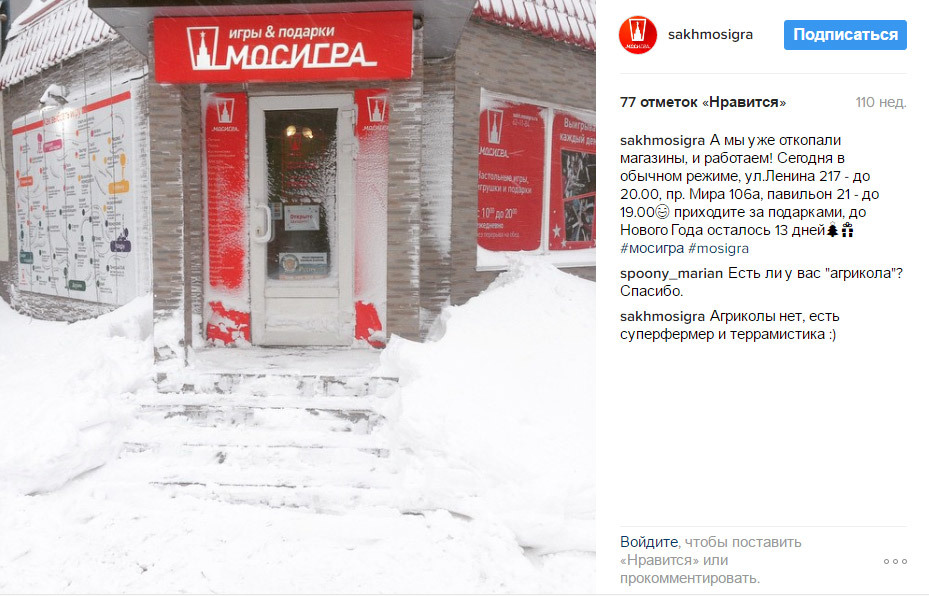
This, incidentally, is a point near the Veranda on the main shopping street of the city - Lenin, 217
Every morning, Danila posts a story or picture on Instagram from 10 a.m. to 10:30 a.m. Then he repeats it on Twitter and Facebook, where there are also quite a lot of people (by local standards). There are 2 thousand followers on Instagram, plus a lot of people who just watch Insta Stories without a subscription, by tags or geolocation. Usually in stories - all sorts of unpacking, mini-reviews. In photographs - a story about a game of some kind. 2 thousand subscribers give 2-4 direct messages per day, which translate into sales, plus people just go from the street and take something. Effective coverage (those who consciously read the post) - about a thousand people. In Yuzhno-Sakhalinsk they don’t like, but come with awareness. I still use Instagram as a directory.
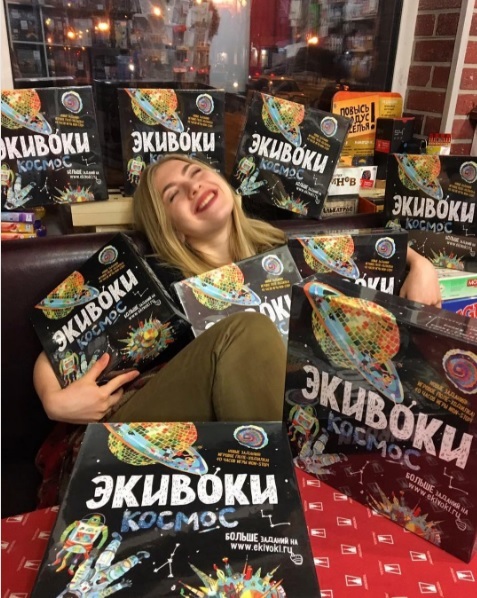
It seems sellers are rushing to come up with something not so strange, but not quite ordinary every time
Now Danila sometimes buys an extension of the instapost coverage for hit games (this is Facebook mechanics). At first, at the first stage, I simply searched for large groups of like-minded people and made friends with them. But unlike mass follow, he didn’t unsubscribe from anyone and continues to read. In the city, by the way, a common story - it happens, a store subscribes to you, then unsubscribes, then again knocks to subscribe in a month: the bots are burning.
We from Moscow dragged a couple of games to local bloggers for reviews, plus Danila himself gave a couple of things “to pick.” On federal advertising, his subscriptions are growing (10-20 people each, but this is noticeable). In general, the city is almost completely encapsulated in terms of social networks, but the approach works amazingly.
In the 2014 crisis, revenue began to grow slowly. In general, both crises are growing in demand: people understand that the table is a good cheap gift that looks great, doesn’t gather dust in the closet, and in general you can immediately play right at the celebration. And this is better than giving a photo frame and a mug. The second point - during a crisis, people often visit each other (save on cinema and restaurants), so they often take their desktops with them. The third point - not a single crisis affected his parents' care for children - they take developmental games and toys as usual - because dad wouldn’t go to airsoft or eat buckwheat instead of steak, but his son would play a new constructor and the daughter will be warmly dressed. And our range of developing children's games has just expanded.
But revenue in Yuzhno-Sakhalinsk grew much earlier than everywhere. The fact was that due to jumps in the euro then prices for European games were rising. If almost everywhere in the country the increase in prices for about 15-20% of the games affected, then here - no. Because the edge of the world, few gifts available, oil. This is the elasticity of demand: the classical method is this: if you raise prices, but they still charge the same, then you can increase it until 20% of buyers start complaining about them. We, even seeing such an effect, could not afford this - for Mosigra as a whole, it was important to keep the prices uniform everywhere. This is part of our strategy for a normal attitude towards customers - not to be greyhound. And this, by the way, pays off well, because no one cuts the branch on which he sits. People perfectly see such things (more precisely, they feel the attitude) and come back later.
In general, there are two points in the city now, and both are successfully operating as a plus. Next to the one near the Veranda, there are toy libraries in the Zerna coffee shop, which are behind the wall of the store. There is a cabinet with board games at the neighbors. There is a table in the store where you can come and play.
In the top now are the Jackal, Ekivoki, Imaginarium and the ubiquitous Monopoly - judging by the demand for it, the market will grow by another 20-30% per year for at least 10 years. She is a very good indicator of how many more people in the city have not tried something, let's say, a little more modern. At least Jengu won.
The assortment last year consistently included English games for local foreign settlers - these are the classic English Elias, the English Scrub and our English Scrabble (ours make it for educating children, but here the Germans love it very much, and it is much cheaper than Scrub) . The Americans go behind Jenga and the Colonialists, the rest, except for Ruff (apparently, who seriously injured them), will not know anything. Given the peculiarity of the city, we are going to send a new line of games in English by summer - those that are produced in Podolsk for Europe and the USA will also go inside the country.
Danil participated in all the major events of the city and the region: Sakhalin’s wings (aviation and music, 40 thousand people) every summer, city day, youth day, fisherman’s day, oilman’s day, and so on. This helped to reach those who did not reach the wave of “handshakes” from friends - well, personally try those games that they say so. In general, it gave good fame.
The city flourishes both in terms of economy and other parameters. Entertainment in recent years has become more. There will be more goods soon too - recently, local residents have been made visa-free entry to Japan, so the shuttles are already starting their race. The "bum" of the crisis is already noticeably ending, people are charging positively.

This is the first point, it was located in a relatively open area (a pavilion in the central market), so there was a lot of snow in the wind. Half an hour with a shovel - and you're cheerful, healthy, and the door can already be opened.
The second thing I learned about Yuzhno-Sakhalinsk is that there are 9,315 kilometers of roads to it. Or 8-9 hours of flight by plane (depending on whether you are going there or back). It can be reached by train and ferry, but it will be about 2 weeks.
But what is important for business - the main lesson of Yuzhno-Sakhalinsk is the use of social networks in small cities. Well, a model store in a city where half of the population produces oil.
What you need to know about the city - and the first point
Now Yuzhno-Sakhalinsk is the second capital of winter, it is very preparing for the Olympics, they are doing everything on snowboarding and skiing. 160 thousand people live in the city - at the time of the opening, we thought that this was the minimum border for the dashboard store in the city (fewer people - unprofitable). Experience has shown that we were mistaken - for 160 thousand people in the city there are now two prosperous Mosigra stores from one franchisee partner.
In addition to the designated 160 thousand "ours", there are also American and German (Danish, Austrian and so on) settlements, a kind of high-tech villages. Specialists live there with their families, help pump oil in the bins of the motherland. This is a kind of exclave in fact: "ours" are not particularly allowed there. About 100 thousand people arrived according to a rough estimate. The main Sakhalin career dream is to work for a foreign company.

The first point was opened in the central market (it has already been demolished) - it is such a combination of small houses and large spans that a place is formed where you can get everything that a resident of the city needs. The very, very center at that time. The opening took place on December 11, 2010, it was one franchise store of the first wave - Yuzhno-Sakhalinsk became the tenth city of Mosigra.

The area of the first point is 21 square meters. There were no articulate standards of layout, no equipment, nothing tricky yet, so the first point was very reminiscent of how we usually imagine a toy store. A little later, everything came, but at that time it was not the main thing.
First new year
The main thing was that the store opened on December 11, and at first Danil did not believe that the amount of goods that the manager from Moscow advises him should really be taken. Well, something dofiga, more like a desire to poke everything at once on the first purchase, right?
Looking a little ahead, I’ll say that on December 31, EVERYTHING was dismantled from the store for lunch. The last opened Monopoly left without a couple of figures - it was sold at a discount, because the client really asked for at least such a thing for his holiday. Only the torn Twister remained. It is important to plan ahead - for 3 critical days of December, when half the goods are taken apart, the decision is no longer made.
And then the worst thing - people still go, but there is no product.Absolutely not. And you are not somewhere, but on an island on the very edge of the world's largest country. Normal delivery is one and a half to two months. Two months without goods with a bare ass and paid rent - the idea is so-so. And scares people, but they are coming. As a result, Danila made a strong-willed decision and ordered an air delivery - 22 thousand rubles per cubic meter. His prices then jumped 15% up from normal retailers - then we had not yet demanded uniform prices across all the country from all stores. Later, a year later, a cheap delivery was found (just 6 weeks long), and everything else. Then it was necessary to survive.
Warehouses of transport companies earned the 8th. The plane arrived on the 9th, and cargo was managed to be received practically from it in the early morning. The store opened and earned again.
Second point
Now we look at what was being done in the city so that people knew about board games. First and foremost, of course - just open a store with a sign. In a city of 160 thousand inhabitants, this is already an event. As we later found out from the experience of Vladivostok and Khabarovsk, it’s important, because Moscow networks do not often reach these parts, and many people come to look at the curiosity.
The second simple step is to launch an information wave. 160 thousand inhabitants are 3-4 “handshakes”, that is, if at the first stage you tell all your friends and call 40 people to the first game room, the city will know in 3 months. The first game library was held a week after the opening of the store - they gathered people in a cafe at the station on the weekend, brought games, played. For the city, free games in cafes were just a gift amidst a rather large deficit of events, and therefore everything went off simply with a bang. There were 5 animators at the first game library, but they were still missing. Later, experienced players explained to the friends the rules of the games themselves, but for the first time - everything is generally new and incomprehensible.

There wasn’t enough space at the first game library
After that they played there every 2 weeks until they changed the point. People were waiting for these games, they were constantly asking when it would be possible. In general, this is a great option to spend a weekend in a city on the edge of the earth.

Game library at a city holiday
From advertising, there was also a banner on the main Sakhalin site: it did not give direct sales, but accelerated people's acquaintance with the point. Banners, by the way, worked in small cities right up to 2015, according to my assessment - in millionaires already in 2011 there was no sense in doing this.
In April, the first offseason began, revenue went into decline. They launched a video about the store on local television in the morning show - they showed it 4 times for 10 minutes. Sales were immediately single, but that video was remembered for a long time, so it seemed to be useful. They survived the off-season, this time they were bought correctly for the holidays, they all prepared and the lines worked perfectly.
In 2012, after the second New Year, Danil formed a rather large pillow of money, and it became clear that it was possible and necessary to expand. In general, our model insures the owner of the point pretty much - it is assumed that he does not invest a lot of money from the very beginning, but opens a small store, then grows the market, and then increases the number of points or moves to a large store.
So, the central market seemed to be about to be demolished, but not soon. Danil looked towards the CityMall shopping center. It was possible to agree only on March 5 - the very ass of the off-season, but in the case of the shopping center the choice was either to make as they want, or not to do. Today everyone wants us and they are ready to meet us within reasonable limits, and then the word "Mosigra" was something incomprehensible to Yuzhno-Sakhalinsk. In general, the store worked for 5 months. The situation turned out to be offensive - they could not fill the new shopping center, and the third floor was deserted, no one went there. After closing the playground on the floor, Danila wanted to move to the first, but they tried to assemble all the toys in the third, and the owners of the shopping center refused him. As a result, I had to close on August 1 - the point worked somewhere around zero. Now he regrets - the shopping center has grown and become very cool, and in a smart way it would be worth waiting and then skim the cream. But then it was unclear that CityMall would fill up, and therefore the decision was still correct. But Danila still nibbled his elbows for almost a year - grabbing a point of 11 squares in such a shopping center would be very, very profitable. Typically, the premises are cut in blocks of 40-50 meters, but here it just turned out a holiday.

Third and fourth points
Problems with the central market rose to their full height - they had to leave. Found an option on Lenin Street. This is a kind of "Arbat" in Yuzhno-Sakhalinsk. In every city there is such an important walking street: in Yekaterinburg, for example, this is Weiner; in Vladimir - Bolshaya Moskovskaya, in Voronezh - Plekhanovskaya and Lenin, and so on. Usually it’s not possible to stand on such a street directly with a facade - either a basement or a second floor; rent is very expensive. Again, in Yekaterinburg we are standing in the shopping center on the third floor, in Vladimir - 50 meters from the stream on the second line, and in Voronezh the whole story with this point, Zhenya had to open a cafe there to stop renting.
It turned out to pick up a “facade” place with an area of 22 squares, with a separate entrance. Right next to the popular Veranda cafe. Expensive, but still it’s not 40 or 60 square meters, so it fits into the model.


New design
Generally, just such an area on the second store is also a kind of luck. However, given that they searched and waited for almost a year, the luck is understandable.

Summer that year was warm, sunny. It turned out especially well that it happened on the weekend.
Two stores worked simultaneously. In the first months, revenue at the new point was less, people just got used to its location. The store worked at zero or a small minus (10-15 thousand a couple of months before the holidays). And after the new year it took off and began to overlap.
The central market was cut out, and at the same time an unusual “tectonic” process began - the center shifted in the city. It so happened that he “slipped” a little to the side because of the transport infrastructure and the abundance of large stores. It was there that Danil opened the third point in the Ganesha shopping center - a small shopping center by our standards, but very noticeable on the stream.
Instagram phenomenon
There is such a peculiarity in working with social networks: in Moscow, for example, VKontakte almost does not work, and in cities less than a million - it breaks everyone. In Yuzhno-Sakhalinsk, Instagram broke everyone. Perhaps the fact is that the peak of growth in its popularity came just at a time when providers and operators began to give normal conditions for tariffs. The whole city is now watching pictures.

This, incidentally, is a point near the Veranda on the main shopping street of the city - Lenin, 217
Every morning, Danila posts a story or picture on Instagram from 10 a.m. to 10:30 a.m. Then he repeats it on Twitter and Facebook, where there are also quite a lot of people (by local standards). There are 2 thousand followers on Instagram, plus a lot of people who just watch Insta Stories without a subscription, by tags or geolocation. Usually in stories - all sorts of unpacking, mini-reviews. In photographs - a story about a game of some kind. 2 thousand subscribers give 2-4 direct messages per day, which translate into sales, plus people just go from the street and take something. Effective coverage (those who consciously read the post) - about a thousand people. In Yuzhno-Sakhalinsk they don’t like, but come with awareness. I still use Instagram as a directory.

It seems sellers are rushing to come up with something not so strange, but not quite ordinary every time
Now Danila sometimes buys an extension of the instapost coverage for hit games (this is Facebook mechanics). At first, at the first stage, I simply searched for large groups of like-minded people and made friends with them. But unlike mass follow, he didn’t unsubscribe from anyone and continues to read. In the city, by the way, a common story - it happens, a store subscribes to you, then unsubscribes, then again knocks to subscribe in a month: the bots are burning.
We from Moscow dragged a couple of games to local bloggers for reviews, plus Danila himself gave a couple of things “to pick.” On federal advertising, his subscriptions are growing (10-20 people each, but this is noticeable). In general, the city is almost completely encapsulated in terms of social networks, but the approach works amazingly.
Now
In the 2014 crisis, revenue began to grow slowly. In general, both crises are growing in demand: people understand that the table is a good cheap gift that looks great, doesn’t gather dust in the closet, and in general you can immediately play right at the celebration. And this is better than giving a photo frame and a mug. The second point - during a crisis, people often visit each other (save on cinema and restaurants), so they often take their desktops with them. The third point - not a single crisis affected his parents' care for children - they take developmental games and toys as usual - because dad wouldn’t go to airsoft or eat buckwheat instead of steak, but his son would play a new constructor and the daughter will be warmly dressed. And our range of developing children's games has just expanded.
But revenue in Yuzhno-Sakhalinsk grew much earlier than everywhere. The fact was that due to jumps in the euro then prices for European games were rising. If almost everywhere in the country the increase in prices for about 15-20% of the games affected, then here - no. Because the edge of the world, few gifts available, oil. This is the elasticity of demand: the classical method is this: if you raise prices, but they still charge the same, then you can increase it until 20% of buyers start complaining about them. We, even seeing such an effect, could not afford this - for Mosigra as a whole, it was important to keep the prices uniform everywhere. This is part of our strategy for a normal attitude towards customers - not to be greyhound. And this, by the way, pays off well, because no one cuts the branch on which he sits. People perfectly see such things (more precisely, they feel the attitude) and come back later.
In general, there are two points in the city now, and both are successfully operating as a plus. Next to the one near the Veranda, there are toy libraries in the Zerna coffee shop, which are behind the wall of the store. There is a cabinet with board games at the neighbors. There is a table in the store where you can come and play.
In the top now are the Jackal, Ekivoki, Imaginarium and the ubiquitous Monopoly - judging by the demand for it, the market will grow by another 20-30% per year for at least 10 years. She is a very good indicator of how many more people in the city have not tried something, let's say, a little more modern. At least Jengu won.
The assortment last year consistently included English games for local foreign settlers - these are the classic English Elias, the English Scrub and our English Scrabble (ours make it for educating children, but here the Germans love it very much, and it is much cheaper than Scrub) . The Americans go behind Jenga and the Colonialists, the rest, except for Ruff (apparently, who seriously injured them), will not know anything. Given the peculiarity of the city, we are going to send a new line of games in English by summer - those that are produced in Podolsk for Europe and the USA will also go inside the country.
Danil participated in all the major events of the city and the region: Sakhalin’s wings (aviation and music, 40 thousand people) every summer, city day, youth day, fisherman’s day, oilman’s day, and so on. This helped to reach those who did not reach the wave of “handshakes” from friends - well, personally try those games that they say so. In general, it gave good fame.
The city flourishes both in terms of economy and other parameters. Entertainment in recent years has become more. There will be more goods soon too - recently, local residents have been made visa-free entry to Japan, so the shuttles are already starting their race. The "bum" of the crisis is already noticeably ending, people are charging positively.
